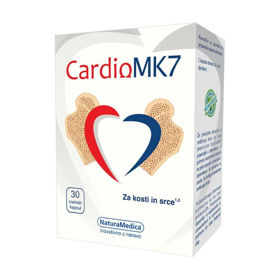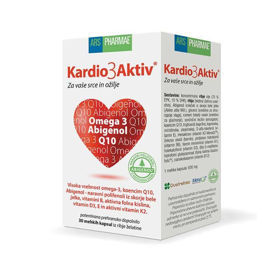Customer question:
What is tachycardia? Anonymous customer's question
Pharmacist's answer:
Tachycardia is a condition in which the heart beats faster than usual. This happens when the heart rate exceeds the normal range of beats per minute for a particular age group.
Usually, a heart rate above 100 beats per minute is considered tachycardia. It is essential to consult your doctor if you notice frequent tachycardia or if other symptoms, such as dizziness, nausea, chest pain, or breathing problems, are present.
What causes tachycardia?
Tachycardia can have different causes.
Below are some of the main factors that can contribute to tachycardia:
- Physical activity: during exercise, it is normal for the heart rate to increase as the heart pumps more blood to provide the muscles with an adequate supply of oxygen.
- Emotional stress: stress or anxiety can trigger the release of hormones such as adrenaline, which increases the heart rate.
- Heat and dehydration: high temperatures or dehydration can increase the heart rate in response to maintaining body temperature and blood pressure.
- Heart disease: Various heart diseases, including arrhythmias, heart failure, valvular disease, or heart attack, can cause tachycardia.
- High blood pressure: High blood pressure can strain the heart, leading to an increase in heart rate.
- Thyroid disorders: Hyperthyroidism, a condition in which the thyroid gland produces too much thyroid hormone, can cause tachycardia.
- Anemia: lack of red blood cells in the blood can lead to an increase in heart rate.
- Certain medications: Certain medications, such as stimulants, decongestants, some antidepressants, and medications for thyroid disorders, can affect heart rate.
- Electrolyte Imbalance: An imbalance of electrolytes such as sodium, potassium, and calcium often affects how the heart works.
- Sudden blood loss: Severe bleeding or blood loss can lead to an increase in heart rate in response to a decrease in blood volume.
Is tachycardia a severe medical condition?
Tachycardia is not necessarily a severe medical condition, as it can occur for different reasons and contexts. Sometimes, tachycardia can be a normal body response to physical activity, emotional stress, or other temporary factors.
However, there are also cases when tachycardia presents a health challenge, especially if it is frequent, long-lasting, or associated with other symptoms. Tachycardia can affect quality of life, cause discomfort, or lead to complications, wildly if the heart is beating irregularly or other heart problems are present.
Some types of tachycardia, such as atrial fibrillation (irregular beating of the upper atria), can increase the risk of heart failure, stroke, or other heart problems. If you experience tachycardia or if symptoms such as chest pain, shortness of breath, dizziness, or nausea are present, it is essential to consult your doctor.
What could cause tachycardia at rest?
Some of the possible causes include:
- Stress and anxiety: emotional stress and anxiety can cause the release of hormones such as adrenaline, which increases the heart rate even when a person is at rest.
- Lack of sleep: Insufficient sleep can affect heart rate and cause tachycardia.
- Dehydration: lack of body fluids can reduce the amount of blood in circulation, leading to an increase in heart rate.
- Fever: heat or hot flashes can cause the heart rate to increase.
- Hyperthyroidism: Increased levels of thyroid hormones (hyperthyroidism) can cause tachycardia.
- Certain medications: Certain medications, such as stimulants, decongestants, or certain antidepressants, can affect heart rate.
- Abnormalities of the heart's "electrical" system: Defects in the heart's impulse-conducting system can cause improper electrical impulse conduction, leading to tachycardia.
- Cardiovascular disease: Cardiac arrhythmias, heart failure, valve defects, or other heart problems can contribute to resting tachycardia.
- Anemia: lack of red blood cells in the blood (anemia) can affect the flow of oxygen and cause an increase in heart rate.
If you notice that you often have tachycardia at rest, or if it is accompanied by other symptoms such as dizziness, chest pain, shortness of breath, or nausea, consult your doctor.
Which heart diseases cause tachycardia?
Tachycardia (increased heart rate) can originate from various heart diseases. Some of these diseases include:
- Atrial fibrillation (AFib): AFib is the most common type of heart arrhythmia in which the upper atria of the heart do not work in sync and contract irregularly. This can cause an irregular heartbeat and an increase in heart rate.
- Supraventricular Tachycardia (SVT): SVT is a collective name for different types of tachycardia in which the heart beats fast and irregularly. These attacks can last from a few seconds to a few hours.
- Ventricular Tachycardia (VT): VT is a more severe form of tachycardia, a fast and irregular heartbeat originating in the heart's lower atria (ventricles).
- Ventricular fibrillation (VFib): VFib is a life-threatening type of cardiac arrhythmia in which the ventricles of the heart beat rapidly and irregularly, preventing blood from pumping effectively.
- Atrial tachycardia: in atrial tachycardia, the heart beats faster but regularly. This can be due to heart valve disease, heart failure, or other heart problems.
- Heart failure: Heart failure is when the heart cannot pump blood efficiently and may develop tachycardia in response to trying to compensate for the reduced pumping.
- Heart valve prolapse (MVP): MVP is a condition in which one of the heart valves does not close properly. This can cause irregular heartbeats, including tachycardia.
- Hyperthyroidism: Increased levels of thyroid hormones in hyperthyroidism can cause increased heart rate and tachycardia.
- Cardiomyopathy: Cardiomyopathies are diseases of the myocardium (heart muscle) that can affect the heartbeat.
- Defects in the "electro" conduction system of the heart: defects in this heart system can lead to incorrect electrical conduction of impulses and consequently to tachycardia.
Interesting Read: Low Heart Rate Under 40
Interesting reading: Sinus tachycardia













